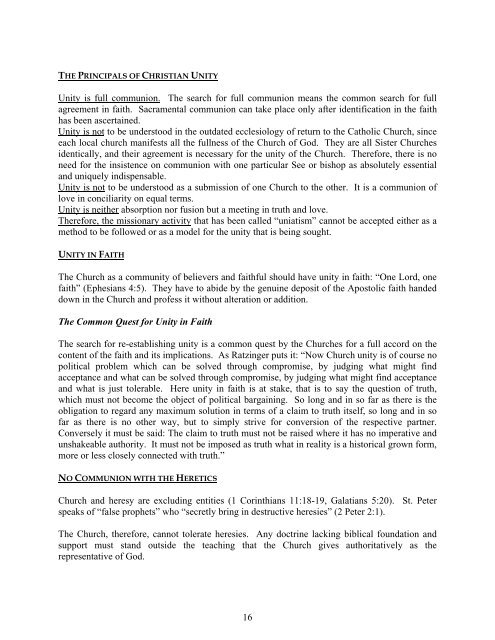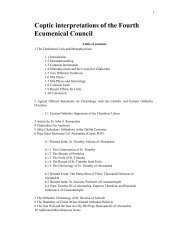Coptic Church & Ecumenical Movement - Saint Mina Coptic ...
Coptic Church & Ecumenical Movement - Saint Mina Coptic ...
Coptic Church & Ecumenical Movement - Saint Mina Coptic ...
You also want an ePaper? Increase the reach of your titles
YUMPU automatically turns print PDFs into web optimized ePapers that Google loves.
THE PRINCIPALS OF CHRISTIAN UNITY<br />
Unity is full communion. The search for full communion means the common search for full<br />
agreement in faith. Sacramental communion can take place only after identification in the faith<br />
has been ascertained.<br />
Unity is not to be understood in the outdated ecclesiology of return to the Catholic <strong>Church</strong>, since<br />
each local church manifests all the fullness of the <strong>Church</strong> of God. They are all Sister <strong>Church</strong>es<br />
identically, and their agreement is necessary for the unity of the <strong>Church</strong>. Therefore, there is no<br />
need for the insistence on communion with one particular See or bishop as absolutely essential<br />
and uniquely indispensable.<br />
Unity is not to be understood as a submission of one <strong>Church</strong> to the other. It is a communion of<br />
love in conciliarity on equal terms.<br />
Unity is neither absorption nor fusion but a meeting in truth and love.<br />
Therefore, the missionary activity that has been called “uniatism” cannot be accepted either as a<br />
method to be followed or as a model for the unity that is being sought.<br />
UNITY IN FAITH<br />
The <strong>Church</strong> as a community of believers and faithful should have unity in faith: “One Lord, one<br />
faith” (Ephesians 4:5). They have to abide by the genuine deposit of the Apostolic faith handed<br />
down in the <strong>Church</strong> and profess it without alteration or addition.<br />
The Common Quest for Unity in Faith<br />
The search for re-establishing unity is a common quest by the <strong>Church</strong>es for a full accord on the<br />
content of the faith and its implications. As Ratzinger puts it: “Now <strong>Church</strong> unity is of course no<br />
political problem which can be solved through compromise, by judging what might find<br />
acceptance and what can be solved through compromise, by judging what might find acceptance<br />
and what is just tolerable. Here unity in faith is at stake, that is to say the question of truth,<br />
which must not become the object of political bargaining. So long and in so far as there is the<br />
obligation to regard any maximum solution in terms of a claim to truth itself, so long and in so<br />
far as there is no other way, but to simply strive for conversion of the respective partner.<br />
Conversely it must be said: The claim to truth must not be raised where it has no imperative and<br />
unshakeable authority. It must not be imposed as truth what in reality is a historical grown form,<br />
more or less closely connected with truth.”<br />
NO COMMUNION WITH THE HERETICS<br />
<strong>Church</strong> and heresy are excluding entities (1 Corinthians 11:18-19, Galatians 5:20). St. Peter<br />
speaks of “false prophets” who “secretly bring in destructive heresies” (2 Peter 2:1).<br />
The <strong>Church</strong>, therefore, cannot tolerate heresies. Any doctrine lacking biblical foundation and<br />
support must stand outside the teaching that the <strong>Church</strong> gives authoritatively as the<br />
representative of God.<br />
16








